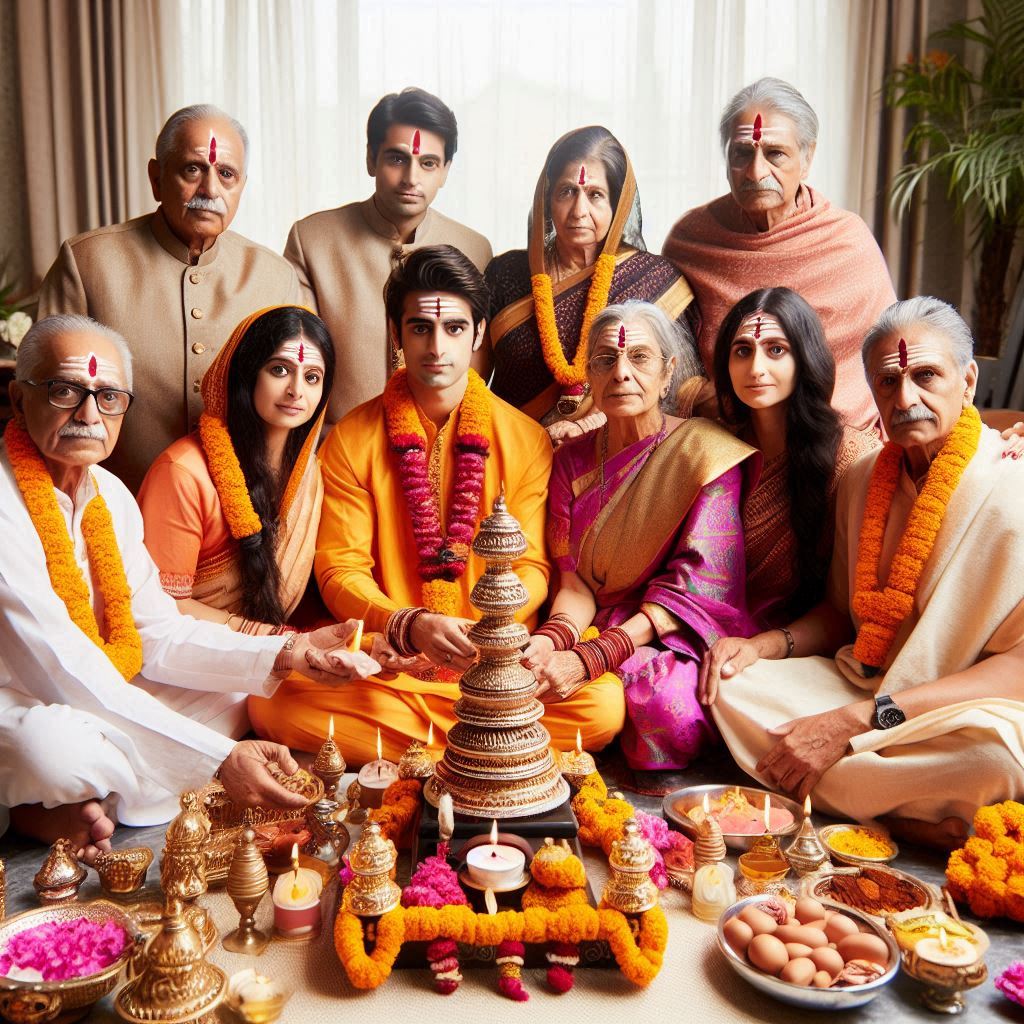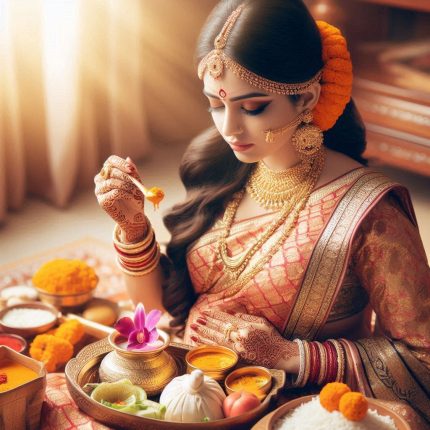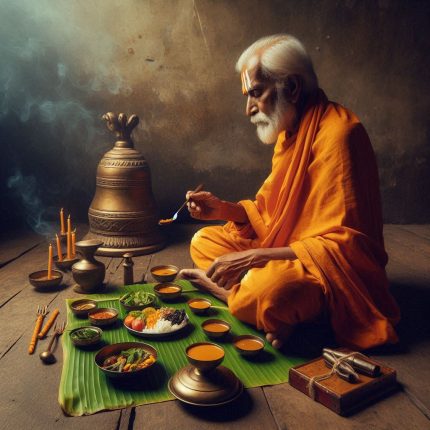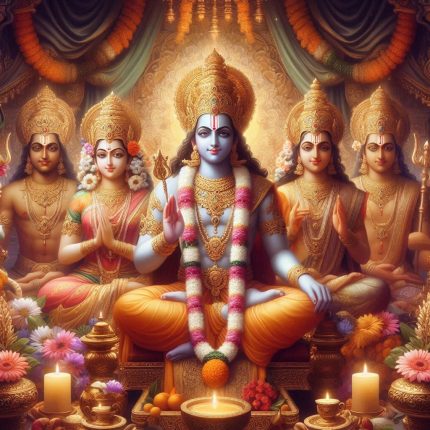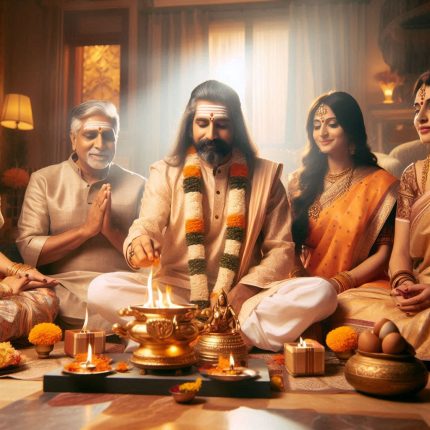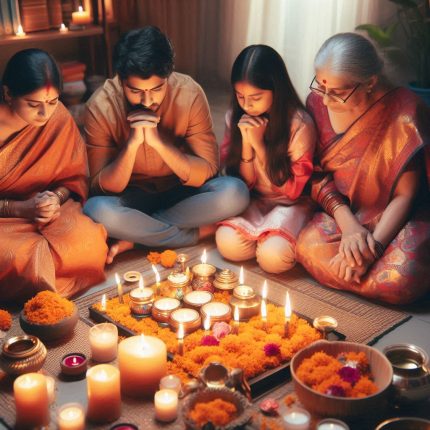Barsi Puja: Honoring the Departed Soul
Samagri
for Puja:
Haldi [organic] (20gm), Kumkum [organic] (20gm), Tulsi Mala (1), Diya Batti (5), Beetle Nuts (5), Desi Ghee (20ml), Honey (20ml), Jaggery (Gudh) (20gm), Akshata [Yellow rice] (20gm), Yagno-paveetha (5), Karpoora [camphor] (5Tabs), Red/White/Yellow Cloth(1 mtr), Prasad [Laung, Elaichi, Mishri] (20gm), Mouli (25mtr), Ganga Jal (15ml), Durva [fresh] (1), Agarbatti (6)/Dhoop (2), Dakshina (100INR), God Idols (pair), Sambrani (2), Sambrani Holder (1), Kalash [small copper] (1), Panchpatra [small copper] (1), Diya Holder (2), Panchamrit spoon (1), Karpoora Holder(1), includes perishables [Beetle Leaves [fresh] (9), Flowers [fresh] (incl mala), Tulsi [fresh], Mango Leaves [fresh] (7)]
Small Havan:
Cow Dung Cake (2), Mango Wood (250gm), HavanSamagri [20+ Grganic Herbs] (100gm), Ghee (20ml)
Yajman to provide:
Curd (100gm), Milk (100ml), Mithai (250gm), Fruits [5types], Coconut (1), HavanKund, SuchiSarva (Havan Spoon) (1), Kalash [big] (1), Bowl [preferably copper/silver] (1), Spoon [preferably copper/silver] (1), Utensils [2 big Plates (for Aarti/Samagri), disposable Plates, Bowls & Spoons], First solid food (preferably Kheer or Payasam)
Introduction
The Barsi Puja, also known as the Death Anniversary Puja or the Shraadha Ceremony, is a sacred ritual performed to honor and remember deceased loved ones. This important ceremony is held annually on the death anniversary of the departed soul, as a way to pay respects, seek blessings, and ensure peace for the departed spirit. The Barsi Puja is deeply rooted in tradition and serves as a meaningful expression of gratitude and remembrance.
Importance and Significance of Barsi Puja
The Barsi Puja holds profound spiritual and cultural significance:
- Honoring the Departed: The puja serves as a tribute to the deceased, acknowledging their contributions and honoring their memory. It reflects the family’s love and respect for the departed soul.
- Seeking Divine Blessings: The ritual seeks blessings from deities for the peace and well-being of the departed soul. It is believed that performing the puja helps the soul find rest and liberation.
- Cultural Tradition: The Barsi Puja is an integral part of cultural traditions, preserving customs and practices related to death and remembrance. It reinforces the importance of familial bonds and respect for ancestors.
- Spiritual Connection: The ceremony strengthens the spiritual connection between the living and the departed, fostering a sense of continuity and respect.
Benefits of Barsi Puja
Participating in the Barsi Puja offers several benefits:
- Peace for the Departed Soul: The puja is believed to provide peace and comfort to the departed soul, helping them attain a higher spiritual state.
- Spiritual Growth: Performing the ritual can enhance the spiritual growth of the family members, reinforcing the importance of compassion, respect, and gratitude.
- Cultural Preservation: The ceremony helps preserve cultural and familial traditions, maintaining a connection to ancestral practices.
- Emotional Closure: It offers an opportunity for family members to remember their loved ones, express their feelings, and find emotional closure.
Occasions to Perform Barsi Puja
The Barsi Puja is performed annually on the death anniversary of the departed soul:
- Death Anniversary: The puja is held on the exact date of the deceased’s passing, according to the Hindu lunar calendar or other relevant calendars based on cultural practices.
- Timing: The ceremony is often scheduled at a specific time deemed auspicious, which can vary based on family traditions and astrological recommendations.
Barsi Puja Vidhi (Procedure)
The Barsi Puja involves a series of traditional and spiritual steps, each contributing to the ritual’s significance:
- Preparation: The family prepares for the puja by setting up a sacred space, often including an altar with images or idols of deities, and preparing offerings such as flowers, fruits, and sweets.
- Invocation of Deities: The ceremony begins with the invocation of deities and ancestors. The family offers prayers and requests their blessings for the departed soul.
- Puja Rituals: The priest performs various rituals, including the offering of water (tarpan) and other sacred items to the departed soul. These rituals are intended to provide comfort and aid in the soul’s spiritual journey.
- Offering of Food: Special dishes are prepared and offered to the departed soul. In many traditions, these offerings are also shared with family members and guests as part of the ceremony.
- Recitation of Mantras and Prayers: The priest recites mantras and prayers dedicated to the deceased, seeking divine intervention and blessings for their peaceful rest.
- Charitable Acts: As part of the puja, families may perform charitable acts or donations in the name of the departed soul, reflecting the spirit of giving and compassion.
- Aarti and Conclusion: The ceremony concludes with aarti (a ritual of offering light) to the deities and ancestors. Family members may also express their personal prayers and thoughts for the departed soul.
Barsi Puja Shubh Muhurat
The Shubh Muhurat (auspicious time) for the Barsi Puja is often determined based on traditional calendars and astrological considerations. Consulting with a priest or astrologer can help identify the most suitable time for performing the ceremony, ensuring that it aligns with auspicious timings.
Conclusion
The Barsi Puja is a deeply meaningful ritual that honours and remembers departed loved ones, providing spiritual comfort and continuity. By participating in this sacred ceremony, families express their love, respect, and gratitude, ensuring that the memory of the deceased remains cherished and honoured. The ritual reinforces cultural traditions, fosters spiritual connection, and offers a profound way to celebrate the lives of those who have passed on.

